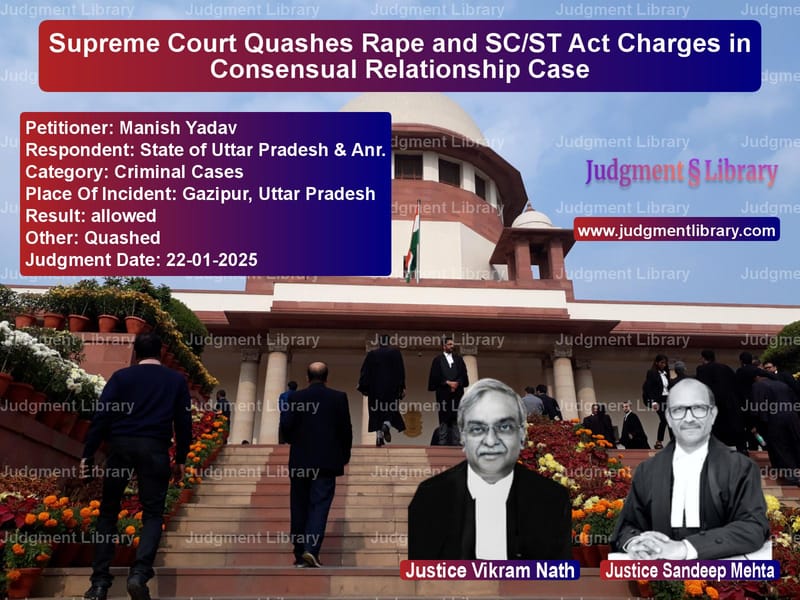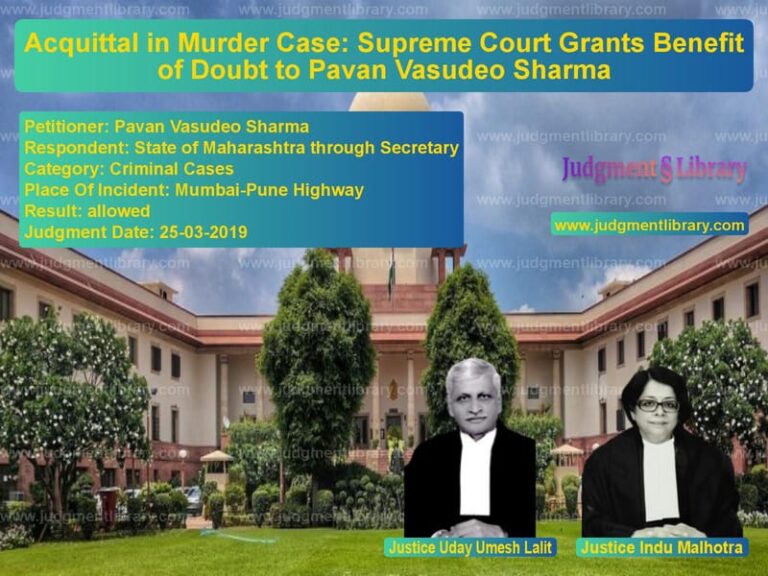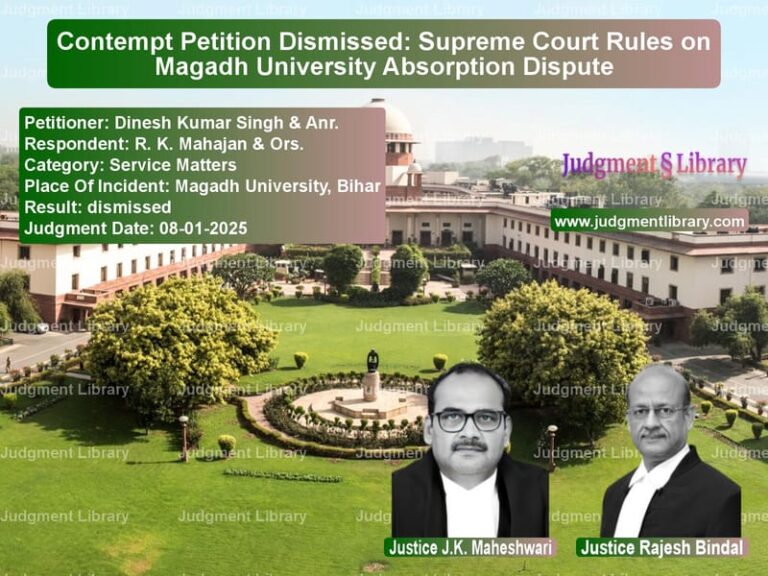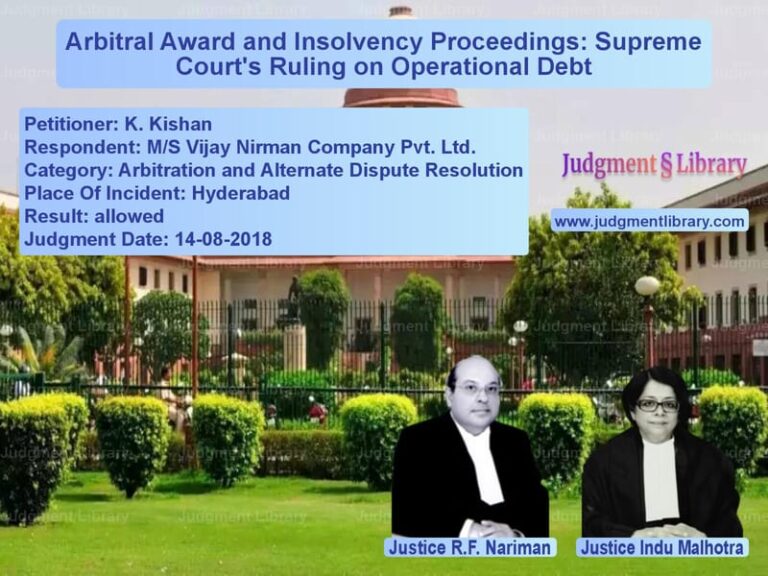Supreme Court Quashes Rape and SC/ST Act Charges in Consensual Relationship Case
The Supreme Court of India, in the case of Manish Yadav vs. State of Uttar Pradesh & Anr., delivered a crucial judgment addressing the allegations of rape and violations under the Scheduled Castes and the Scheduled Tribes (Prevention of Atrocities) Act, 1989 (SC/ST Act). The Court ruled that the allegations did not constitute an offense as the relationship between the accused and the complainant was consensual. This decision reaffirms the legal principle that a breach of promise to marry does not necessarily amount to rape.
Background of the Case
The case originated from Crime No. 387 of 2023, registered at Police Station Kotwali, District Gazipur. The accused, Manish Yadav, was charged with the following offenses:
- Sections 376 (Rape), 323 (Voluntarily causing hurt), 504 (Intentional insult), and 506 (Criminal intimidation) of the Indian Penal Code (IPC), 1860.
- Sections 3(1)(r), 3(1)(s), 3(2)(5a), and 3(2)(v) of the SC/ST Act.
The case arose when the complainant, a woman who belonged to a Scheduled Caste, alleged that the accused had sexually exploited her under the false pretense of marriage and later refused to marry her due to her caste status. The complainant also accused him of verbal and physical abuse.
Petitioner’s Arguments
The petitioner, Manish Yadav, challenged the summoning order issued by the Special Judge, SC/ST Act, Gazipur, which was later upheld by the High Court of Judicature at Allahabad. His legal team argued:
- The relationship between the accused and the complainant was consensual.
- The complainant herself admitted that they were in a romantic relationship and had engaged in sexual relations willingly.
- The complainant had declined the accused’s proposal for marriage, stating that she wanted him to secure a job first.
- The caste-based allegations were fabricated and unsupported by evidence.
- There was no basis for the offense under the SC/ST Act as the complainant did not mention any caste-based abuse in her initial statements.
Respondent’s Arguments
The prosecution, representing the State of Uttar Pradesh, countered these claims, stating:
- The accused had lured the complainant into a physical relationship under the false pretense of marriage.
- After engaging in relations with the complainant, the accused refused to marry her, citing caste differences.
- The accused had subjected the complainant to physical and emotional abuse.
Observations of the Supreme Court
The Supreme Court Bench, comprising Justices Vikram Nath and Sandeep Mehta, examined the evidence, including the complainant’s statements recorded under Section 164 of the Code of Criminal Procedure (CrPC). The Court made the following key observations:
Consent in a Relationship
“The complainant herself admitted that despite her initial hesitation, she trusted the accused and willingly entered into a relationship. Her statement suggests that their intimacy was consensual and did not result from coercion or a false promise.”
No Misrepresentation of Marriage
“The accused had, on multiple occasions, expressed his willingness to marry the complainant. However, she declined his proposal, stating that she wanted him to secure a job first. This clearly contradicts the claim that she was deceived into a physical relationship on the false pretense of marriage.”
Legal Precedents on False Promises of Marriage
The Court cited previous rulings to clarify the distinction between a breach of promise and a false promise:
- In Uday v. State of Karnataka (2003) 4 SCC 46, it was held that a relationship based on mutual affection and not induced by fraud cannot be categorized as rape.
- In Deepak Gulati v. State of Haryana (2013) 7 SCC 675, the Court noted that there is a distinction between a mere breach of promise and a deliberate deception.
- In Deelip Singh v. State of Bihar (2005) 1 SCC 88, the Court ruled that a promise to marry must be proven false at the outset to establish a charge of rape.
Absence of Caste-Based Abuse
“The complainant did not initially allege that the accused had insulted her caste. There is no evidence to support the claim that caste-based abuse took place. Thus, the ingredients of the offenses under the SC/ST Act are not met.”
Final Judgment
The Supreme Court set aside the summoning order and quashed all proceedings against the accused. The Court ruled:
“Allowing the prosecution of the appellant for the alleged offenses would amount to an abuse of the process of law.”
Directions Issued
- The summoning order dated August 24, 2023, passed by the Special Judge, SC/ST Act, Gazipur, was quashed.
- The charges under Sections 376, 323, 504, and 506 IPC and Sections 3(1)(r), 3(1)(s), 3(2)(5a), and 3(2)(v) of the SC/ST Act were dropped.
- All legal proceedings against the accused were dismissed.
Impact of the Judgment
This ruling reinforces legal principles regarding consent and the misuse of rape laws. The Court emphasized that:
- A breach of promise to marry is not automatically equivalent to rape.
- Consensual relationships should not be criminalized based on later disputes.
- Allegations under the SC/ST Act must be backed by clear and credible evidence.
Conclusion
The case of Manish Yadav vs. State of Uttar Pradesh & Anr. is a significant ruling that clarifies the legal standards surrounding false promises of marriage and allegations under the SC/ST Act. By quashing the case, the Supreme Court has ensured that criminal law is not misused in matters of consensual relationships gone wrong.
Petitioner Name: Manish Yadav.Respondent Name: State of Uttar Pradesh & Anr..Judgment By: Justice Vikram Nath, Justice Sandeep Mehta.Place Of Incident: Gazipur, Uttar Pradesh.Judgment Date: 22-01-2025.
Don’t miss out on the full details! Download the complete judgment in PDF format below and gain valuable insights instantly!
Download Judgment: manish-yadav-vs-state-of-uttar-prade-supreme-court-of-india-judgment-dated-22-01-2025.pdf
Directly Download Judgment: Directly download this Judgment
See all petitions in Bail and Anticipatory Bail
See all petitions in SC/ST Act Case
See all petitions in Suicide Cases
See all petitions in Fraud and Forgery
See all petitions in Extortion and Blackmail
See all petitions in Judgment by Vikram Nath
See all petitions in Judgment by Sandeep Mehta
See all petitions in allowed
See all petitions in Quashed
See all petitions in supreme court of India judgments January 2025
See all petitions in 2025 judgments
See all posts in Criminal Cases Category
See all allowed petitions in Criminal Cases Category
See all Dismissed petitions in Criminal Cases Category
See all partially allowed petitions in Criminal Cases Category







